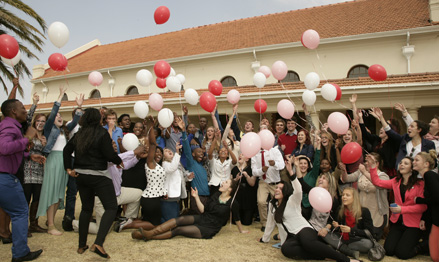Latest News Archive
Please select Category, Year, and then Month to display items
26 July 2022
|
Story Bulelwa Moikwatlhai
|
Photo Supplied
 Experiencing the UFS in person for the first time are from the left: Sandor Potjer (VU Amsterdam), Bulelwa Moikwatlhai (UFS OIA), Ricarda Kochems (Bremen University, Germany), Froukje Pronk (VU Amsterdam) and Matome Mokoena (UFS OIA)
Experiencing the UFS in person for the first time are from the left: Sandor Potjer (VU Amsterdam), Bulelwa Moikwatlhai (UFS OIA), Ricarda Kochems (Bremen University, Germany), Froukje Pronk (VU Amsterdam) and Matome Mokoena (UFS OIA)
As the UFS COVID-19 Regulations and Required Vaccination Policy has been lifted with immediate effect – allowing 100% capacity of both students and staff members and a fully operational campus – the
Office for International Affairs welcomes its first physical exchange cohort after two years. The cohort of students hail from the various international partners of the UFS, namely the
University of Bremen in Germany, the Vrije Universiteit Amsterdam, and Sciences PO Bordeaux in France. The students will be hosted in the UFS faculties of the Humanities, Economic and Management Sciences, and Natural and Agricultural Sciences, respectively.
These students have been paired with
Umoja Buddy Programme ambassadors to help ensure their smooth transition and integration into student life at the UFS. Furthermore, the students received an invitation from the President of the
International Student Association (ISA), Courtney Madziwa, to join their association, thus exposing them to students from other countries to learn about the various cultures.
On 18 July, the Office for International Affairs (OIA) arranged a hybrid orientation programme for the exchange students, including those students who have not yet arrived on the Bloemfontein Campus. The students took part in an icebreaker activity, where they had the opportunity to learn from and teach other participants about their home countries. Dr Cornelius Hagenmeier, Director of the OIA, welcomed the exchange students to the Bloemfontein Campus, and expressed excitement to have physical exchanges again. Furthermore, the guest presenters ranged from student leadership, staff members, and service providers.
The presentations were practical, demonstrating, among others, how to create a password on the institutional website – presented by Mr Molemo Mohapi from UFS ICT. The presentation on how to fully utilise Blackboard was facilitated by Ms Vuthihi Mudau from the UFS CTL division. We take the safety of all our students seriously, so Ms Elise Oberholzer from the UFS Protection Services has given the students some tips on how to safeguard themselves.
‘Your capacity for change is limitless’
2013-09-13
|
 |
Ready for the world - students taking part in the 2013 Leadership for Change programme getting ready to travel to universities in the USA, Europe and Asia.
Photo: Johan Roux
12 September 2013 |
“You will change this campus, city, country, continent and the world, because you have the capacity for greatness,” Prof Jonathan Jansen, Vice-Chancellor and Rector of the University of the Free State (UFS), said.
He addressed the 2013 group of first-year students in the Leadership for Change programme at a farewell function before they will leave for universities abroad. The first 104 students from the 2013 total of 144 will depart on 18 September and return on 3 October 2013. The second group of 40 students will be abroad from 11 to 25 January 2014. The students are from the Bloemfontein and Qwaqwa Campuses. They will be accompanied by mentors from the UFS.
The students will visit 17 universities in the USA, Europe and Asia.
The first 71 first-year students in the Leadership for Change programme were sent abroad for two weeks in September 2010 to get intense exposure to the academic, social, cultural and residential lives of students in the USA. In 2011 the student number more than doubled and universities in Europe were included. In July 2012 the programme brought students from around the globe to the UFS for the Global Leadership Summit.
Prof Jansen inspired the young leaders, saying, “If you learn leadership values in your four years of study, a change will come. Build the new value system and take it into the country. Your capacity for change is limitless.”
He encouraged them to learn to know the stranger, not only abroad, but also the beggar at the street corner. “Learn to be comfortable with the beggar, as well as with the professor in the classroom.”
A stringent evaluation and training programme preceded the group’s visit abroad, and Prof Jansen could not formulate their achievement better: “I cannot tell you how proud I am of you.”